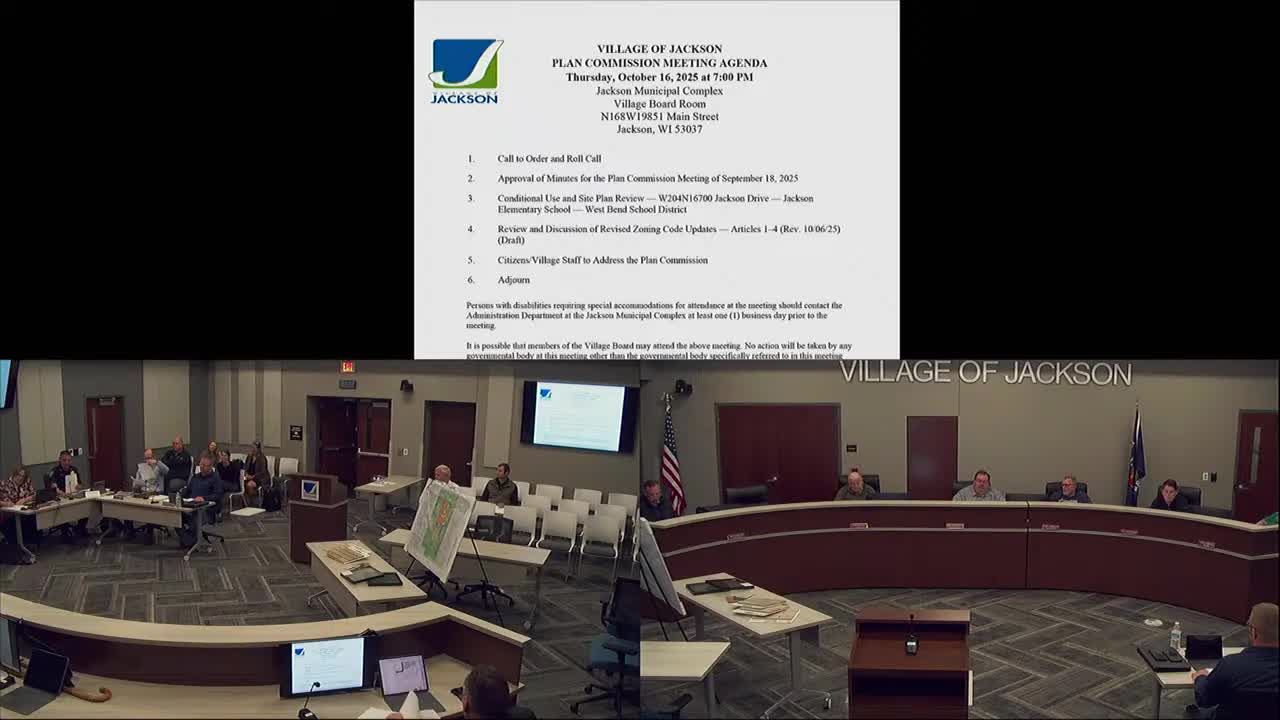Plan commission places draft Zoning Code Articles 1–4 on file after overview
October 17, 2025 | Village of Jackson, Washington County, Wisconsin
This article was created by AI summarizing key points discussed. AI makes mistakes, so for full details and context, please refer to the video of the full meeting. Please report any errors so we can fix them. Report an error »

The Village of Jackson Plan Commission on Oct. 16, 2025 reviewed and placed on file a first draft of Zoning Code Articles 1–4, which restate general provisions, interpretation and definitions, administration roles and procedural rules for applications and public hearings.
The draft package, presented as the opening four articles of a larger revised zoning code, covers jurisdiction and applicability, code interpretation and general definitions, the roles of the Plan Commission, Board of Appeals and a designated zoning administrator, and the procedures for applications, notices, public hearings, site visits, neighborhood meetings and financial guarantees.
Plan commission staff summarized Article 1 as the code’s general provisions, including where the code applies and how it relates to other local regulations. Article 2 contains interpretation rules and general definitions; Article 3 sets out administration and responsibilities for the Plan Commission, Board of Appeals and the zoning administrator; Article 4 documents procedural matters including burden of proof, application withdrawal, appeals, public‑hearing notice requirements and the possibility of site visits or neighborhood meetings prior to formal submission of large projects.
Presenter Tim (staff member) characterized the drafts as standard procedural material: “A lot of them are ... just real simple basic provisions,” he said, noting additional articles will follow. Commissioners asked whether conditional use permit authority and other decision responsibilities would be captured in later articles; staff confirmed those topics will be addressed in Article 5 and related sections that follow this initial packet.
The draft introduces specifics on public‑hearing practice, including notice types and a public‑comment framework that mirrors current village practice (for example, a two‑minute public‑comment limit per speaker, as noted in the draft). The procedural article also codifies that applicants bear the burden of proof on development applications, that properties in violation must resolve outstanding violations before seeking new approvals, and that the village may require financial guarantees (letters of credit or cash deposits) to secure completion of landscaping or other work when seasonal constraints prevent immediate completion.
Commissioners discussed whether public hearings should be held at the Plan Commission level rather than at the Village Board stage to capture input earlier in the review process; staff suggested that discussion will continue in later articles and policy decisions about where hearings are best held. Division 5 of the draft encourages neighborhood meetings for larger, potentially controversial projects and outlines a recommended framework for those meetings.
A motion to place draft Articles 1–4 on file carried; staff said further drafts and subsequent articles will be brought forward for review in coming weeks.
The draft package, presented as the opening four articles of a larger revised zoning code, covers jurisdiction and applicability, code interpretation and general definitions, the roles of the Plan Commission, Board of Appeals and a designated zoning administrator, and the procedures for applications, notices, public hearings, site visits, neighborhood meetings and financial guarantees.
Plan commission staff summarized Article 1 as the code’s general provisions, including where the code applies and how it relates to other local regulations. Article 2 contains interpretation rules and general definitions; Article 3 sets out administration and responsibilities for the Plan Commission, Board of Appeals and the zoning administrator; Article 4 documents procedural matters including burden of proof, application withdrawal, appeals, public‑hearing notice requirements and the possibility of site visits or neighborhood meetings prior to formal submission of large projects.
Presenter Tim (staff member) characterized the drafts as standard procedural material: “A lot of them are ... just real simple basic provisions,” he said, noting additional articles will follow. Commissioners asked whether conditional use permit authority and other decision responsibilities would be captured in later articles; staff confirmed those topics will be addressed in Article 5 and related sections that follow this initial packet.
The draft introduces specifics on public‑hearing practice, including notice types and a public‑comment framework that mirrors current village practice (for example, a two‑minute public‑comment limit per speaker, as noted in the draft). The procedural article also codifies that applicants bear the burden of proof on development applications, that properties in violation must resolve outstanding violations before seeking new approvals, and that the village may require financial guarantees (letters of credit or cash deposits) to secure completion of landscaping or other work when seasonal constraints prevent immediate completion.
Commissioners discussed whether public hearings should be held at the Plan Commission level rather than at the Village Board stage to capture input earlier in the review process; staff suggested that discussion will continue in later articles and policy decisions about where hearings are best held. Division 5 of the draft encourages neighborhood meetings for larger, potentially controversial projects and outlines a recommended framework for those meetings.
A motion to place draft Articles 1–4 on file carried; staff said further drafts and subsequent articles will be brought forward for review in coming weeks.
View full meeting
This article is based on a recent meeting—watch the full video and explore the complete transcript for deeper insights into the discussion.
View full meeting
